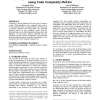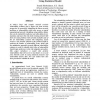46 search results - page 1 / 10 » An empirical model to predict security vulnerabilities using... |
ESEM
2008
ACM
13 years 6 months ago
2008
ACM
Complexity is often hypothesized to be the enemy of software security. If this hypothesis is true, complexity metrics may be used to predict the locale of security problems and ca...
ICST
2010
IEEE
13 years 2 months ago
2010
IEEE
—Many factors are believed to increase the vulnerability of software system; for example, the more widely deployed or popular is a software system the more likely it is to be att...
IPPS
2007
IEEE
13 years 10 months ago
2007
IEEE
In today’s large and complex network scenario vulnerability scanners play a major role from security perspective by proactively identifying the known security problems or vulner...
CCS
2008
ACM
13 years 6 months ago
2008
ACM
Software complexity is often hypothesized to be the enemy of software security. We performed statistical analysis on nine code complexity metrics from the JavaScript Engine in the...
ESEM
2010
ACM
13 years 2 months ago
2010
ACM
Open source software is often considered to be secure because large developer communities can be leveraged to find and fix security vulnerabilities. Eric Raymond states Linus’ L...


